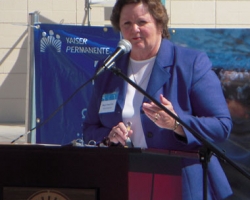Nearly 120 fourth grade students from Rosebank Elementary School were invited to make a splash at the Parkway Family Aquatic Center on Tuesday.
The free swim lesson was a collaboration of the Friends of Chula Vista Parks and Recreation, a local non-profit that supports recreational programs for kids in Chula Vista, and Kaiser Permanente.
Kaiser has helped keep the program, Operation Splash, afloat by donating $50,000 for the third year in a row, which covers the expenses of swimming lessons for two weeks and absorbs the cost for transportation from the school to the pool.
To date, nearly 4,000 students have participated in the Elementary Learn to Swim program since 2006 and more than 2,000 kids have learned to swim through the event.
“Operation Splash is an extraordinary program,” Mayor Cheryl Cox said. “Kaiser’s continued support is a valuable gift to the youth in the community.”
Operation Splash was developed as part of Kaiser Permanente’s Southern California Healthy Eating, Active Living efforts to reduce obesity in the community. It started in Los Angeles in 2006 and has donated $2.5 million in grants to improve swim safety and expand access to public pools and increase physical activity in low-income areas. It also aims to decrease the risk of drowning and injuries that occur near the water.
Last year, nearly 60 percent of ELTS students had never had a swim lesson, yet almost all of them reported time spent at beaches, lakes or pools, said Manuel Gonzalez, the aquatics supervisor for the city of Chula Vista.
“That’s basically a recipe for disaster,” he said.
With ongoing budget difficulties, the grant comes at a crucial time for the recreation department.
“Despite the economy and particularly in this region, we’ve been able to offer programs that are very affordable as well as a variety of free programs that help keep kids active,” Gonzalez said.
Many of the schools participating in the program are located in neighborhoods where obesity rates are among the highest in the nation. Students are monitored for strength and endurance and will be encouraged to participate in numerous free recreation programs offered by the city’s recreation department.
The city’s recreation director, Buck Martin, said that Kaiser has allowed the program to make an impact in the health of future generations.
Chula Vista lifeguard Michiyo Wellington-Oguri has worked three summers with the Chula Vista’s aquatics department and taught fourth graders how to perform CPR at Operation Splash using an automated external defibrillator.
“Even if the kids can’t perform CPR they still have the basic knowledge in saving someone’s life,” Wellington-Oguri said.
According to Mary Ann Downing, board member of the National Drowning and Prevention Alliance, although drowning is the leading cause of death in 1- and 2-year-olds, drowning risk increases in the teenage years. She added that many of the NDPA members have suffered an injury or the loss of a loved one.
“The tragedy of childhood drowning needs to command local and national attention, and it needs to end,” she said.
“We’re really on the cutting-edge of aquatics and getting kids to learn about water safety and also in terms of fighting childhood obesity,” Gonzalez said. “Getting them into the water and teaching them how to swim is absolutely vital.”
Cox said saying thank you is simply not enough.
“We can overcome accidents and tragedies if we have responsible adults and children who know how to swim,” Cox said.

